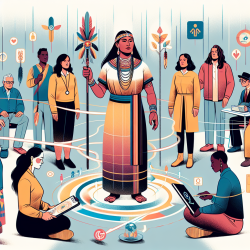Understanding the Rise in Intimate Partner Violence in Rwanda
The alarming increase in intimate partner violence (IPV) in Rwanda, as reported in the study "Correlates of intimate partner violence against women during a time of rapid social transition in Rwanda: analysis of the 2005 and 2010 demographic and health surveys," presents a critical issue for practitioners. Between 2005 and 2010, self-reported IPV among women in Rwanda nearly doubled, coinciding with significant social and political changes. This blog explores the implications of these findings and how practitioners can leverage this data to improve outcomes for affected individuals.
Key Findings from the Study
The study, conducted by Thomson et al., analyzed data from the 2005 and 2010 Rwanda Demographic and Health Surveys. It identified several risk factors associated with IPV, including:
- High alcohol consumption by partners
- Polygynous marriages
- Low education levels of partners
- Socioeconomic stressors, such as in-kind compensation
Interestingly, the study also found that women involved in their own health and earnings decision-making were less likely to experience IPV, suggesting a protective effect of empowerment.
Implications for Practitioners
Practitioners working with families in Rwanda can use these findings to tailor interventions that address the root causes of IPV. Here are some actionable steps:
- Promote Alcohol Awareness: Implement programs that educate about the effects of alcohol on behavior and relationships.
- Support Educational Initiatives: Encourage educational opportunities for both men and women to foster environments where IPV is less likely to occur.
- Empower Women: Develop initiatives that support women's involvement in decision-making processes within their households.
- Engage Men in Dialogue: Create forums for men to discuss and redefine masculinity in ways that do not involve dominance or violence.
Encouraging Further Research
The study highlights the need for further research to understand the complex dynamics of IPV in Rwanda fully. Practitioners are encouraged to engage in or support research efforts that explore:
- The effectiveness of current interventions, such as the Isange One Stop Center project
- The role of changing gender roles in IPV dynamics
- Long-term trends in IPV and the impact of socioeconomic changes
By staying informed and involved in ongoing research, practitioners can contribute to a more nuanced understanding of IPV and help develop more effective interventions.
To read the original research paper, please follow this link: Correlates of intimate partner violence against women during a time of rapid social transition in Rwanda: analysis of the 2005 and 2010 demographic and health surveys.










